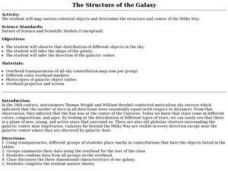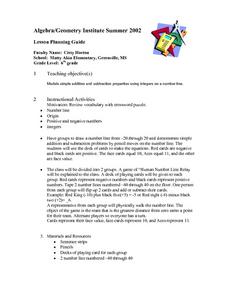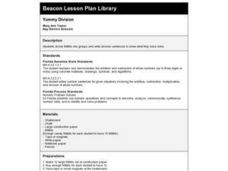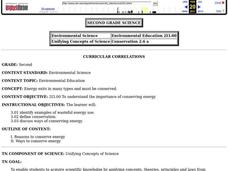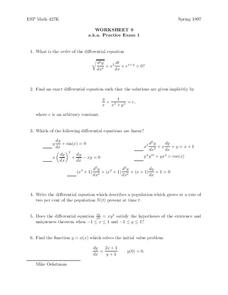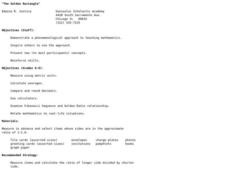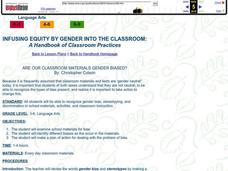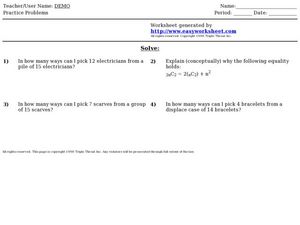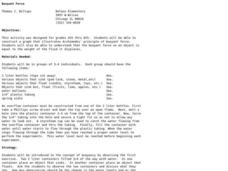Curated OER
The Structure of the Galaxy
Students infer the galaxy shape. In this structure of the galaxy lesson students observe the distribution of objects in the sky and answer questions.
Curated OER
Addition & Subtraction Properties With Integers
Sixth graders use a number line to solve addition and subtraction problems. In groups, they play a game of "Human Number Line Relay." They use a deck of cards to randomly create addition and subtraction equations and physically walk a...
Curated OER
Physical Differences
Students read the book We Can Do It! and discuss how we are all physically different. In this physically different lesson plan, students read the book, discuss their differences, and participate in a smelling and touching activity to see...
Curated OER
Yummy Division
Second graders watch as volunteers divide large paper M&Ms on the board. They divide M&Ms into groups and write division sentences to show understanding of division concept. They eat M&Ms.
Curated OER
Exploring the MapleCopter
Study explore the motion of maple seeds and design experiments to explain their spinning flight patterns. They make observations, explain ideas of motion, use models, analyze previous reports and experiments, identify relevant factors...
Curated OER
Counting on Counting
Students recognize that counting tells how many objects are in the set irrespective of how they are arranged or the order in which they are counted. They solve problems involving one more or less to a given set using their knowledge of...
Curated OER
Force And Motion
Eighth graders investigate the concept of force and motion while conducting short class activities. They compare the differences of potential and kinetic energy while rolling objects on a ramp. Students also measure the distance that...
Curated OER
How To Find the Area of a Square And Rectangle
Students practice using the formula to calculate the area of a square or triangle. They participate in large group guided practice using simple area of squares problems then complete a series of problems calculating the area of rectangles.
Curated OER
Mechanism of Vision
Young scholars explore the eye and its vision. In this science lesson plan, students learn the way light reflected from objects enters the eye, the basic anatomy and physiology of the eye, and the basic mechanism of perception.
Curated OER
Ants in Your Pants
First graders read "One Hundred Angry Ants" by Elinor Pinczes. They identify various sums that equal ten and display them on a chart.
Curated OER
Pizzas And Things
First graders problem solve using the concepts of doubling and halving numbers as previews for finding multiples and working with fractions. They determine how to find half of a set of objects and work with sums up to 16. They work with...
Curated OER
Electricity
Students watch instructor present demonstrations of the basic principles of static electricity, and then conduct some of their own experiments. In small groups, students build simple circuits, using batteries, to try to light up a light...
Curated OER
Volume
Students participate in a teacher demonstration of the water level in different beakers to investigate the measurement of volume. Next, working in small groups, they replicate the demonstration and determine how the measurements in the...
Curated OER
Energy Conservation
Class is divided into groups of 2-4 students. They then are given a list of 36 items that are found in our homes and which use electricity. They are going to pretend that because of an energy shortage, they have to pick only twelve items...
Curated OER
Worksheet 9 Practice Test 1
In this math instructional activity, students find the solutions to the differential equations. Then they examine the group of equations in order to determine the ones that are linear.
Curated OER
The Golden Rectangle
Students explore the concept of the golden ratio. In this golden ratio lesson, students measure objects to determine if their measurements fit the golden ratio. Students calculate the average measurements of the class.
Curated OER
Use Symbols to Subtract
Students practice crossing out items in a group in order to complete subtraction problems. In this subtraction lesson plan, students watch a PowerPoint presentation and then practice problems on their own.
Curated OER
Are Our Classroom Materials Gender Biased?
Students explore equality by analyzing their own classroom belongings. For this gender bias lesson, students investigate their classroom and identify objects as either male or female biased. Students collaborate while exploring the idea...
Curated OER
Combinations: nCr
In this probability learning exercise, high schoolers choose to use the combination formula to calculate how many ways an object can be chosen. There are 4 questions.
Curated OER
Dichotomous Key
Students develop an understanding of how a dichotomous key is organized. In this dichotomous lesson, student are put into small groups, and work together dividing their group of similar objects (buttons, paper clips, screws, keys...)...
LABScI
Projectiles: Target Practice
Angry Birds prepared them, but now pupils must prove their skills with projectiles! Scholars test different variables to determine which ones impact the distance the projectile flies. The experiment provides connections to kinetic and...
Curated OER
Cool to Rule: A Game of Prediction and Measurement
Pupils demonstrate measurement and estimation skills. In small groups, they are given a measurement, predict what object in the classroom is equal to that specific measurement, and record their data in a table that includes the...
Curated OER
Just a Little Bit
Second graders read the book, "Just a Little Bit" and work in groups weighing the same object with a scale. They then get a different unit of measurement, like paper clips, cotton balls, washers, or pennies and then figure out and record...
Curated OER
Buoyant Force
Students illustrate Archimedes' Principle of Buoyant Force. In this graphing lesson, students will observe that the buoyant force on an object is equal to the weight of the fluid it displaces. Students will then create a graph showing...


